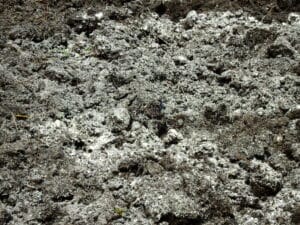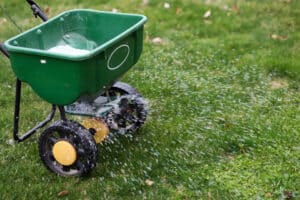
How To Get Rid of Clover in Your Lawn Naturally
Get a quote from lawn care experts near you
Using synthetic herbicide can kill clover, but it can also damage grass, kill ornamental plants, and pollute waterways. We’ve compiled a list of ways to get rid of clover naturally without using synthetic herbicides. We’ll also recommend our top lawn care services for maintaining a healthy lawn that’s less likely to grow weeds such as clover.
What’s Causing Clover in My Lawn?
There are multiple reasons you could have clover sprouting up in your lawn, most of which have to do with your soil. Clover can grow well in soil conditions where turfgrass struggles.
How To Get Rid of Clover Naturally
Here are the top ways to eliminate clover in your lawn without synthetic herbicides.
Pull It Out By Hand
You can remove small clovers manually. Gently loosen the soil with a spade and tug the clover out, roots and all. If you leave any roots behind, the clover will grow back.
Deprive It of Sunlight
You can kill clover by blocking sunlight from reaching it. Take plastic sheeting or an opaque garbage bag and place it over the patch, securing the corners with rocks to make sure it doesn’t fly up. This should get rid of the clover in a few weeks. Be mindful that this approach will also kill any grass or other plants under the plastic.
Spray a Vinegar Solution
While vinegar can kill weeds, there are some important things to be aware of when using it. First, the household vinegar you get at the grocery store (about 5% acetic acid) is unlikely to be effective. You’ll need to purchase concentrated vinegar (20%–30% acetic acid). At this strength, vinegar can cause skin and eye damage, so you should wear protective gear.
Second, vinegar is a non-selective herbicide. That means it may kill any plants it touches. Third, it may burn the leaves of the clover but leave the roots intact. However, if you’d like to use vinegar to kill clover, buy horticultural vinegar from a gardening store and follow the instructions on the label.
Apply an Organic Herbicide
Organic herbicides containing concentrated vinegar, sodium borate, or ammoniated soap may be effective against weeds like clover. Note that “organic” is not the same as “nontoxic”—something that kills plants is, by definition, toxic. Most of these herbicides are non-selective, and some may contaminate soil if not used properly.
Can You Prevent Clover in Your Lawn?
There are a number of ways you can prevent clover from growing in your lawn in the first place. You can use preemergent herbicides or these less-toxic methods.
Spread Organic Fertilizer
Using organic, slow-release, nitrogen-rich fertilizer will make your lawn less hospitable to clover. Some homeowners prefer traditional, fast-release synthetic fertilizer because it grows grass quickly and costs less. However, using organic fertilizer will lead to healthier growth in the long run. Common organic fertilizers include cow manure, guano, blood meal, bone meal, earthworm castings, and liquid kelp.
Use Corn Meal Gluten
Corn meal gluten releases organic peptides into your soil, preventing the clover’s growth. This won’t work on existing clover, but will prevent new seeds from sprouting—indiscriminately, so be careful not to use this method if you’ve recently reseeded your lawn.
Luckily, this measure won’t harm existing nearby grass. You can purchase corn gluten meal at your local garden store or online. You’ll need to time the application carefully with the weather, since the meal must be watered immediately after being applied, but then it needs several dry days in a row to work. You may also need to reapply after several weeks.
Mow Grass High
Clover grows best in grass less than 3 inches tall. Mowing too short stresses your grass, making it easier for clover to spread. Mowing your grass high gives it an advantage, allowing it to outcompete the clover for sunlight and water.
Are There Benefits To Having Clover in Your Lawn?
You may not like the look of clover, but it can actually benefit your lawn. In fact, some homeowners combine white clover seeds with cool-season turfgrass when seeding their lawn.
What Is the Best Professional Lawn Care Company?
TruGreen, our top choice for lawn care services, does not offer natural weed control, but the TruNatural Lawn Care Plan includes natural fertilization, which can keep clover from growing in the first place. The lawn care company also offers five different annual programs and a variety of a la carte services so that you can customize your lawn care for your lawn’s unique needs.
Frequently Asked Questions
What will kill clover but not grass?
Selective herbicides such as triclopyr and glyphosate can kill broadleaf weeds such as clover without harming grass. Unfortunately, most organic herbicides are nonselective and will kill turfgrass.
Should I get rid of clover in my lawn?
There are several reasons to keep clover in your lawn. Clover gathers nitrogen from the air and releases it into the soil. It often outcompetes other weeds, attracts pollinators, and keeps its green appearance in many conditions.
How do you control clover?
You can control fertilizer with proper fertilization, mowing high, applying corn gluten meal before it sprouts, hand-pulling it, depriving it of sunlight, or using a traditional herbicide.
Why is clover taking over my lawn?
Clover can take over your lawn in the right conditions: Low grass, the wrong soil pH, compacted soil, and poor nitrogen levels are excellent growing conditions for clover.
Our Rating Methodology
We back up our lawn recommendations with a detailed rating methodology that we use to objectively score each provider. We review lawn care plans and packages, navigate the provider website and speak with customer service representatives, request quotes, and analyze customer reviews for each provider. We then score the provider against our review standards for plan options, additional benefits and customizability, availability, trustworthiness, and customer service to arrive at a final score out of 100.
Find Lawn Care Experts Near You

To share feedback or ask a question about this article, send a note to our Reviews Team at reviews@thisoldhousereviews.com.













